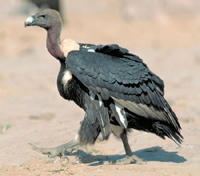
Tens of millions of Asian vultures-including the oriental white-backed vulture (Gyps bengalensis), above-have vanished from the Indian subcontinent since the early 1990s (Image: Goran Ekstrom)Today saw a glimmer of hope for the three species of Asian vulture threatened with extinction.
Oriental white-backed, long-billed, and slender-billed vultures in South Asia have suffered one of the most rapid and widespread population declines of any bird species, declining by more than 97% over the last 10-15 years.
These declines were caused by the widespread veterinary use of the drug diclofenac for the treatment of sick domestic livestock throughout the Indian subcontinent. Diclofenac kills vultures that feed on the bodies of livestock that have been given the drug shortly before death.
To combat diclofenac's devastating effects on vulture populations, the Indian government announced, in March 2005, its intention to phase out the use of the drug. However, progress has been hampered by the lack of an alternative drug that is known to be safe for vultures yet effective for treating livestock.
In a new report published in the open access journal PLoS Biology, a team of scientists from South Africa, Namibia, India, and the UK concluded that such an alternative has now been found.
The team, led by Gerry Swan of the University of Pretoria, found that the drug meloxicam was safe to vultures at the likely range of levels they would be exposed to in the wild. Meloxicam, which is similar to diclofenac in its effectiveness for treating livestock, has recently become available for veterinary use in India and could easily be used in place of diclofenac.
"This research is an excellent example of international collaboration in response to an urgent conservation problem," Said Dr Debbie Pain, Head of International Research at the RSPB and a co-author of the paper.
Fellow-author Dr Rhys Green, Principal Research Biologist at the RSPB and a scientist at Cambridge University, said: "Dr Lindsay Oaks discovered that diclofenac is the cause of the vulture declines just two years ago, so having found a practical solution so quickly is encouraging. Even so, vulture populations are declining so fast that it could still be too late to save them unless action is taken immediately."
Publication of these results is very timely because the government of India today convened a two-day international meeting to decide how to save the endangered vultures. Removal of diclofenac from their food supply is a vital step, so the identification of an alternative drug may have come just in time.
Dr Asad Rahmani, Director of the Bombay Natural History Society said: "It is essential that the government of India acts quickly to make good use of this new information. Diclofenac must be replaced by meloxicam as soon as possible and there are many things that government can do to speed this up."
The vulture declines have had profound ecological and social consequences. Vultures play a vital role in environmental health by disposing of carcasses and reducing the risk of disease.
The two key steps necessary to save vultures from extinction are removal of diclofenac from their food chain, and the establishment of conservation centres for captive breeding as a stop-gap measure until that is achieved.
"It is essential that the environment is free of diclofenac before vultures from conservation breeding centres can be released into the wild," said RSPB Research Biologist Dr Richard Cuthbert, who coordinated the new research. "In view of these findings, there is now no reason for governments to delay in banning the veterinary use of diclofenac."
Source : Public Library of Science
 Print Article
Print Article Mail to a Friend
Mail to a Friend
